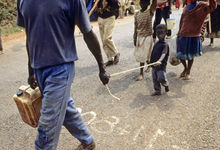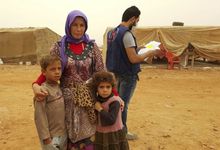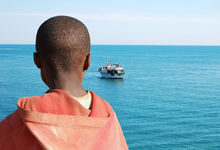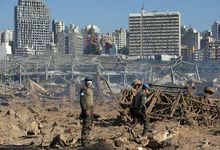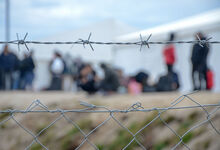A trend that makes you sad
Each year on 20 June the UNHCR, the UN Refugee Agency, observes World Refugee Day to honour people who have had to flee. Traditionally, it shines a light on and promotes the solidarity with refugees. The UNHCR has just issued a warning against apathy and inaction.
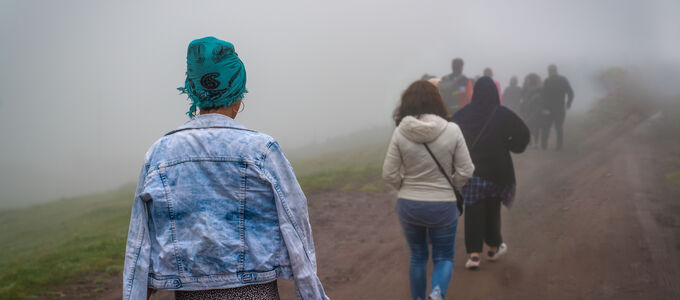
More relevant than ever
For more than ten years, it’s been enough to simply change two numbers to update one specific sentence in press releases: “War and violence drove global displacement to an estimated xxx million by the end of September 20xx.” The general public is hardly aware that the number of refugees has doubled during this period.
The UN Refugee Agency (UNHCR) was founded in 1950 to help millions of people who had lost their homes during the Second World War. The original plan was that the Office of the United Nations High Commissioner for Refugees (UNHCR) was only supposed to exist for three years and then be dissolved once its work was done.
However, global crises and emergencies means that the United Nations body still exists seventy years later and must report on new highs in every annual report.
Record figures and individual fates
According to the Refugee Agency, more than 117 million people will have been forced to leave their homes and flee in 2023. Forty per cent of these people are under 18 years old. In general, this fate hits young people particularly hard because it robs them of their future. In recent years, an average of 339,000 children per year have been born as refugees. Contrary to some vehemently expressed opinions, one thing is clear: none of these people leave their homes without a reason. “These drastic and rising numbers conceal countless human tragedies,” the UN High Commissioner for Refugees Filippo Grandi says. The reasons for forced displacement such as wars, persecution of minorities, famines, and increasing natural disasters have absolutely nothing to do with tourism.
Forced displacement means leaving your home, family, and friends behind and setting off with nothing but the barest of essentials. Forced displacement means not knowing what the future holds and living, indeed surviving, on the streets, at sea, in emergency shelters, and tent cities. On top of all this there is the experience of indifference and rejection.
God was a refugee
Anyone who points out that this is primarily an issue of world politics and not of the Christian faith is simply ignoring the basics: the Bible.
Israel’s exodus from slavery in Egypt helped characterised the image of a liberating God who accompanied His people into the desert. But the biblical texts are also characterised by migration in many other ways. The economic migrant Abraham, who sought refuge in Egypt with all of his possessions. Or Jacob and David, who feared for their lives and fled. Then there is the story of Lot, who fled from the burning city of Sodom. Noah and his family were displaced by a natural disaster. The list of refugees reported in the Bible is much longer. The flight of Joseph and Mary with the newborn Jesus is a reminder of this: God Himself became a refugee in the person of Jesus.
“What can I do?”
Individuals realise that their own willingness to help may be unlimited, but that there are limits to how much help is actually possible. This does not mean that one should proceed based on the motto: “If I can’t help everyone, I’m not helping anyone.”
Many biblical passages describe how strangers and foreigners should be treated. A good image is that of the last judgement starting in Matthew 25: 35. Through the stranger who needs help, we encounter Christ, God, and then have the opportunity to welcome or reject Him.
Chief Apostle Jean-Luc Schneider pointed out how important it is to act on the commandment to love our neighbour: “We are in the new covenant, where only one thing counts in order to obtain salvation: faith that works through love.”
The relevance of social commitment is also clearly described in the Catechism:
“The New Apostolic Church is committed to the gospel and the imperatives of Christian ethics. Thus it understands its duty to include charitable activity which benefits people irrespective of gender, age, colour, nationality, or religion. Within the scope of its abilities, the Church offers assistance to those in difficult situations of life. This work is supported through the voluntary commitment of many helpers in the congregations, but also through material assistance.”
Inspired by this, the Church implements numerous projects in collaboration with various humanitarian organisations.
And yet it is everyone’s responsibility to practise love of neighbour whenever possible. Or as Filippo Grandi says, “No one chooses to be a refugee. But we can choose to help these people.”
Photo: Bilal - stock.adobe.com
Article info
Author:
Date:
Keywords:
Simon Heiniger
20.06.2024
Aid agencies,
Social commitment,
Congregational life


